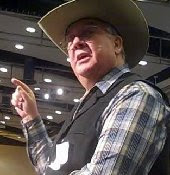Pimp My Ride, Flex My Fuel
Quoting from President Barack Obama’s campaign speech,
“We can’t drive our SUVs and eat as much as we want and keep our homes on 72 degrees at all times… and then just expect that other countries are going to say OK. That’s not leadership. That’s not going to happen.”
The year of 2009 was rushed in with President Obama announcing that U.S. energy independence would be his administration’s second priority right behind getting the U.S. economy back on track.
In order to do that, the President will have to keep his campaign pledge to push for the country to use 60 billion gallons of “advanced” bio fuels and substantially reduce carbon emissions by the year 2030. According to an article in Bio Diesel Magazine, the current usage of on-highway diesel fuel in the U.S. is 33 billion gallons per year. If all of the vegetable oil and animal fat were used to produce biodiesel, we could only replace about 14 percent of the current demand for on-highway diesel.
Compare that to the fact that we have consumed just 197 billion barrels of U.S. oil since the first domestic oil well was drilled in Pennsylvania in 1859. President Obama also promised to require all new vehicles sold in the country to be “flex fuel” vehicles, which will be able to use fuel containing mostly bio fuel by the end of his first term.
Jack Lee, 4Refuel’s President and CEO, says that his company’s fuel management system goes a long way in answering President Obama’s mandate on the use of alternative fuels as well as to reduce carbon emissions.
Bill Bishop, 4 Refuel's Vice President of Marketing, says that greenhouse gas emissions are averted through the company’s on-site fuel management approach. Innovative use of biodiesel will assist with greenhouse gas reductions. “If you start using say a B20 blend, you'll get about a 15 percent reduction in greenhouse gas emissions,” Bishop says.
There are unquantifiable benefits to appealing to customers’ increasing awareness of becoming “ecologically friendly”. 4Refuel feels that their business model can and should be replicated in the U.S. They disclose that their model will re-energize end users of fuel with overall cost savings while at the same time aiding in the reduction of green house gases with the use of bio fuels. 4Refuel believes it will also be a win-win situation for both petroleum distributors and the environment.
In January 2009, the Senate Finance Committee approved $31 billion in tax credits and financial incentives to boost alternative energy supplies and promote conservation. Their plan included most of the $20 billion in energy tax breaks approved by the House Ways and Means Committee, plus more incentives to help alternative energy companies. Most of those energy related items are contained in the $787 billion Stimulus Package signed into law by President Barack Obama on February 17, 2009.
Establishing the new “Green Plan” will come at a great cost to the average consumer’s pocket book. President Obama, with Congressional approval, will have to increase taxes on gasoline and diesel fuel in order to create the necessary cash to pay for all the projects he is proposing in order to become energy independent.
One of the ways to raise financing will be to increase the present Federal Road Excise Tax on gasoline and diesel. The National Surface Transportation Infrastructure Financing Commission has already recommended an increase of 10 cents per-gallon on gasoline and 14 cents per gallon on diesel, as well as indexing the federal excise tax to inflation.
During their meeting on February 26, 2009, the panel also backed the adoption of a controversial system to begin charging motorists based on how many miles they drive by the year 2020. However, this plan may not be seen through to fruition because President Obama has already stated his opposition.
To increase the Federal Road Excise Taxes will a very simple task to accomplish as it will only take simple majority approval by Congress, which is now being controlled by the Democrats. The justification for these additional taxes could be based on the current administration’s attempt to discourage the use of fossil based fuels as the primary energy source for our automotive and industrial needs.
For the moment, fossil fuels will remain the answer as we search for alternate energy sources to replace a larger percentage of the products refined from crude oil. Solar power, nuclear, wind and even natural gas will only be able to replace a small percentage of our total energy requirements in the next decade.
The "National Clean Energy Project" forum, chaired by Senator Harry Reid, was held in Washington on February, 23, 2009. It was attended by such governmental luminaries as former President Clinton, Former Vice President Al Gore, Speaker of the House Nancy Pelosi and Energy Secretary Steven Chu.
Their report outlined a plan to develop a secure, reliable, interoperable, national, and clean electricity grid to power America’s coming clean energy economy. Particular policy recommendations focused on the principle bottle necks for building grid projects.
One of the participants was former oilman T. Boone Pickens, who is now promoting wind power to generate electricity. He was interviewed by Neil Cavuto for Fox News Network. Mr. Pickens announced that the panel was going to formulate a new energy policy for the first time in forty years.
Notably absent from the forum were representatives from either the major oil companies or their trade organization, the American Petroleum Institute. Their intentional exclusion tells the tale of what is yet to come in the world crude oil markets.
You will soon see more flex fuel automobiles and large trucks running on natural gas driving on the highways and byways in the U.S. In other words, Americans better get ready to pimp their cars or trucks for the new century.
Subscribe to:
Post Comments (Atom)

No comments:
Post a Comment